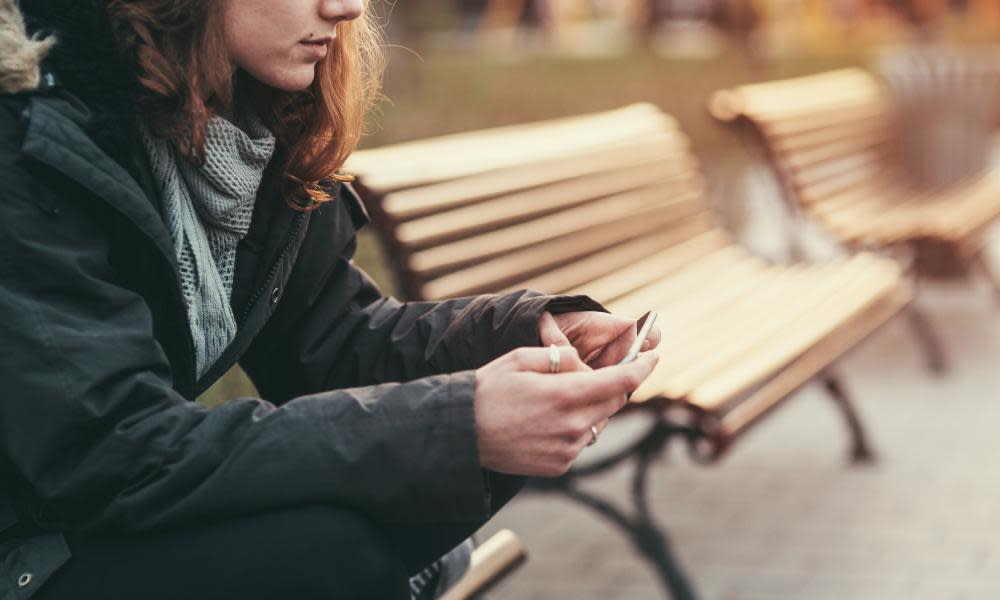UK teenagers turn to mobile apps to help with mental ill health

Tens of thousands of young people in Britain who are struggling with their mental health are seeking help online for problems such as anxiety, self-harm and depression.
Soaring numbers of under-18s are turning to apps, online counselling and “mood diaries” to help them manage and recover from conditions that have left them feeling low, isolated and, in some cases, suicidal.
A generation of young people are attracted by being able to receive fast, personal care and advice using their phone rather than having to wait up to 18 months to be treated by an NHS mental health professional.
The shift comes as ministers brace themselves for publication on Thursday of the first new figures for 13 years showing how common mental heath problems are in the young.
Experts believe they will show a big rise from the one in 10 schoolchildren who were identified as having a diagnosable mental health condition when the last research was done in 2005, partly as a result of the emergence of social media and its use in cyberbullying and fuelling feelings of inadequacy.
The number of under-18s using Kooth, a free online counselling service, has shot up from 20,000 in 2015 to 65,000 last year, and is forecast to rise further to 100,000 this year.
One hundred NHS clinical commissioning groups across England, more than half the total, have now commissioned the service. It helps young people suffering from anxiety, low mood, poor self-worth or confidence, self-harm and loneliness.
“Young people like the fact they can talk to a counsellor either instantly, or within 10 minutes, for up to an hour in the evenings. They love that immediacy”, said Aaron Sefi, the research and evaluation director at XenZone, the company behind Kooth.
“They also love the anonymity involved, because they can sign up without giving their personal details. Plus, they’re in control, because they are choosing to contact us rather than being told to do so.”
Its use of video counselling and supportive text messages also help young people feel less alone, he said.
In addition, 123,138 people in the UK downloaded Calm Harm, an NHS-approved app that helps people self-harm less often or not at all, between April 2017 and this month. Of those, 56% were aged between 10 and 18 and 82% were girls or women.
“Users tell us that Calm Harm helps with suicidal thoughts and intent,”, said Dr Nihara Krause, the consultant clinical psychologist who developed the app. “Currently 92% of our users, who are mainly female and often aged 15-21, say the urge reduced.”
The app, which launched in 2015, also helps people who have impulse control problems, such as obsessive compulsive disorder, eating disorders and problem drinking, she said.
Calm Harm is among 18 apps that NHS England has endorsed to help tackle mental ill-health. They also include BlueIce, which helps young people manage their emotions using a mood diary, techniques to reduce feelings of distress and automatic routing to emergency help numbers if their urges to self-harm continue.
Experts welcomed the trend but warned that online help must complement, not replace, face-to-face appointments with therapists, psychologists and psychiatrists.
“Most young people spend much of their time online, and it can feel easier for them to communicate through messaging and online services than face-to-face,” said Tom Madders, campaigns director at Young Minds, which helps people under 26.
“Evidence-based mental health apps and online support services can be really beneficial in helping young people to look after their own mental health, develop strategies for coping with difficult emotions, and get accessible information and advice when they need it.”
Claire Murdoch, NHS England’s national mental health director, said: “Technology is constantly evolving and young people are usually at the forefront, so it’s no surprise increasing numbers are turning to services like these which can certainly play a part, particularly when backed up by face-to-face support.”
The NHS’s forthcoming long-term plan, due next month, will “harness all of the benefits these advancements can bring”, she added.
Meanwhile, 37% of the young people referred to NHS child and adolescent mental health services (Camhs) in England last year were refused help, the children’s commissioner has revealed.
In an analysis of Camhs care published on Thursday, the children’s commissioner for England, Anne Longfield, says that despite promises by politicians and NHS bosses to improve access, “a vast gap remains between what is provided and what children need”.
While she found improvements in several areas of care, including care for eating disorders, new mothers and under-18s in the criminal justice system, overall “the current rate of progress is still not good enough for the majority of children who require help but are not receiving it”.
Of more than 338,000 children and young people referred to Camhs last year, 31% were treated within a year. But 37% got no help at all and another 32% were still waiting for treatment to start at the end of the year, she found.
In the UK, Samaritans can be contacted on 116 123

 Yahoo News
Yahoo News 
